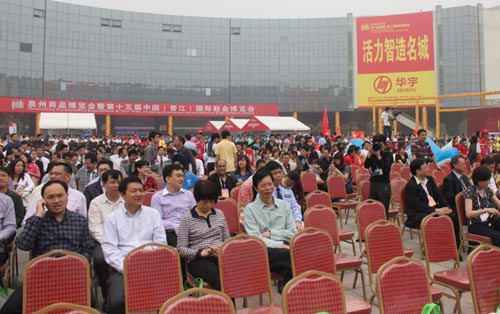Jinjiang companies look to the global stage
- By Elsbeth van Paridon
 0 Comment(s)
0 Comment(s) Print
Print E-mail China.org.cn, April 21, 2013
E-mail China.org.cn, April 21, 2013
On April 18, 2013, Mayor Liu Wenru of Jinjiang City, Fujian Province, officially opened the city’s 15th International Footwear Exhibition, which each year lures in Chinese and foreign traders in the field of sports shoes and sportswear. The city counts a population of nearly two million and a large number of foreign-invested factories.
On an international level, Jinjiang City has established enduring cooperation with more than 40 countries, with the district's products entering many of the globe's major markets.
In order to promote the area’s own brands on a global level, and not merely as a manufacturing base, the city now seeks and encourages mergers and acquisitions as well as other moves towards expansion by domestic enterprises. The annual Footwear Exhibition undeniably plays an essential role in this phase.
One example of such foreign interest is German native Matthias Weigl from the Shanghai office, of InConex, which specializes in the sourcing of different metal parts and components and provides different manufacturing techniques. Weigl told China.org.cn reporter how the exhibition and its associated conferences provide genuine networking opportunities. “[The exhibition is an] excellent opportunity to enlarge one’s network and forge contacts for future cooperation; especially since the area is keen to improve its manufacturing ability,” he said.
“With Jinjiang’s current economic and industrial development, as well as its listed development projects [with a focus on innovation], the city is becoming a strong contender to successfully develop its [primary domestic] brands onto the international stage; cooperation subsequently becomes win-win.”
Several big international names, such as Polo Ralph Lauren and Adidas, have production bases in the area, a choice which can also be attributed to China’s lower labor costs. The key for Jinjiang’s enterprises to take their business to the next level lies in the alteration of their enterprise structures.
Promoting the companies to international brands and subsequently attracting their business can expand their focus from domestic to global. Improving manufacturing abilities and ensuring the workers’ social, healthcare and employment rights (or “proper employment” as mentioned in the 2010 Jinjiang development plan) can boost productivity and heighten any brand’s international reputation.
Septwolves and 361 degrees are two prime examples of brands which employ the latest technology in clothing production as well as provide their employees with entire work communities covering every aspect from specialized training to childcare.
In August of 2012, Mayor Liu said in a Chinadaily.com.cn interview: " Though most of these [nationally certified] brands are well-known names in China, they are hardly known outside the country […] Jinjiang will offer not only incentives, but also rewards for enterprises that acquire well-known global brands."
At this year’s 15th International Footwear Exhibition, Liu sat down for an interview with China.org.cn during his already packed press schedule, and in his explanation paid particular attention to the brands’ need for innovation (a belief which originally stemmed from the area’s production leftover supply) as well as that for the “employment of culture” -- the latter also being one of the key points in the city’s overall 2012 development plan. Many companies have since included IPOs in their business planning, and have been listed on stock exchanges to gather global capital for expansion, according to a Caixin.com report in 2012.
In terms of innovation, Liu explained the city’s current use and research of new materials in its manufacturing industry forms an important example which could provide the brands with a competitive edge. Secondly, instead of buying Nike running shoes, Liu believes that Chinese people have to take a chance on the domestic brands available to them nowadays, such as 361 Degrees. Only then, he feels, can such domestic brands really take off globally.
The exhibition runs until April 20.







Go to Forum >>0 Comment(s)